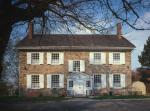Chapter One: Crossing the Delaware
The Trenton Tavern was a loud, happy place on Christmas Day, 1776. A couple of weeks earlier, British commander William Howe had decided that he had spent enough time chasing the American forces across New Jersey and his troops would spend the rest of the winter months in camp. For many of the royal soldiers stationed at outposts like the one at Trenton, this decision was especially welcome because they had little personal stake in the war.
During the course of the American Revolution, the British army relied heavily on about 30,000 professional soldiers, mainly from German provinces like Hesse-Kassel, who were paid by the crown in exchange for their services. Known as Hessians, these German soldiers were content to celebrate their first Christmas in America with heavy feasting and drinking.
The Hessian commander at Trenton, Col. Johann Rall, spent the day and almost the entire night at the tavern, playing cards with fellow officers and relaxing. At one point, a servant apparently handed the colonel a message from a courier, but Rall either failed to read the note, or discounted it. Several hours later, as the Hessian colonel lay dying of battle wounds, those caring for him discovered the crumpled message in his pocket. It warned that American troops were on their way to Trenton.
The Continental Army's Christmas night crossing of the Delaware River and its surprise raid on Trenton was one of the most spectacular episodes of the entire war. The daring strike came during a low point in the conflict for the Americans. They had suffered a series of reversals on the battlefield and faced the real prospect of a total collapse of their army.
By early December, Howe's army had driven George Washington and most of his forces across the Delaware River into eastern Pennsylvania. The American commander scrambled from place to place in Bucks County, hoping to reorganize the Continental defenses. Rumors spread that the British were preparing to capture Philadelphia. Washington bluntly admitted that there was little he could do to stop an invasion. "Happy should I be if I could see the means of preventing [a British assault]," he informed the Continental Congress, "At present I confess I do not."
There was considerable panic among residents of the city of Philadelphia. Congress declared martial law in Philadelphia on December 8, 1776, and many patriots fled the city. The same day, Washington took over Summerseat, the country mansion of his friend Thomas Barclay. From Summerseat, he issued several directives aimed at restoring order. The Continental Congress authorized him to take full control over the armed forces.
Summerseat, he issued several directives aimed at restoring order. The Continental Congress authorized him to take full control over the armed forces.
Then General Howe made his fateful decision to stop the British advance. Exactly why the British commander chose to give up his enormous military advantage is difficult to explain. His dispatches to London indicated that he believed the best way of suppressing the rebellion was to discourage it through the use of overwhelming force. He requested over 15,000 additional troops that he planned to use for a spring offensive in 1778 that he claimed "would strike such terror through the country that little resistance would be made to the progress of his Majesty's arms."
What Howe failed to anticipate, however, was both the limits of his own government (which rejected his request) and the audacity of his opponents. General Washington ignored the overwhelming odds against him and seized the opportunity presented by the British encampment to plot a surprise raid.
 Washington's Crossing of the Delaware on Christmas night in 1776 resulted in a stunning American victory. Continental forces braved the icy river and captured nearly one thousand surprised Hessians at the Trenton outpost. A week later they scored a second, equally improbable success at Princeton. Those victories allowed Washington to reestablish an American presence in New Jersey, which had been completely under British control, and rally at least some degree of public opinion for the patriot cause.
Washington's Crossing of the Delaware on Christmas night in 1776 resulted in a stunning American victory. Continental forces braved the icy river and captured nearly one thousand surprised Hessians at the Trenton outpost. A week later they scored a second, equally improbable success at Princeton. Those victories allowed Washington to reestablish an American presence in New Jersey, which had been completely under British control, and rally at least some degree of public opinion for the patriot cause.
They did not end the problems in his army, however. Thousands of soldiers proved incapable or unwilling to fight, either wracked by illness or eager to leave as their enlistments expired. A Revolutionary War burial site in Bucks County offered a resting place for hundreds of soldiers who became sick and died after fighting in the frigid conditions around Trenton and Princeton.
A Revolutionary War burial site in Bucks County offered a resting place for hundreds of soldiers who became sick and died after fighting in the frigid conditions around Trenton and Princeton.
As the Continental army waited out the winter months in the area around Morristown, New Jersey, there was an uneasy lull in the fighting. Behind the scenes, the British argued over grand strategy, while the Americans desperately tried to recruit more men, protect their remaining soldiers against disease, and somehow improve their meager supplies. The advantages still seemed to rest overwhelmingly with the British, but each month that passed was another month of at least nominal American independence. What General Howe, in his leisurely pace, did not quite realize was that time was the only factor not on his side.
During the course of the American Revolution, the British army relied heavily on about 30,000 professional soldiers, mainly from German provinces like Hesse-Kassel, who were paid by the crown in exchange for their services. Known as Hessians, these German soldiers were content to celebrate their first Christmas in America with heavy feasting and drinking.
The Hessian commander at Trenton, Col. Johann Rall, spent the day and almost the entire night at the tavern, playing cards with fellow officers and relaxing. At one point, a servant apparently handed the colonel a message from a courier, but Rall either failed to read the note, or discounted it. Several hours later, as the Hessian colonel lay dying of battle wounds, those caring for him discovered the crumpled message in his pocket. It warned that American troops were on their way to Trenton.
The Continental Army's Christmas night crossing of the Delaware River and its surprise raid on Trenton was one of the most spectacular episodes of the entire war. The daring strike came during a low point in the conflict for the Americans. They had suffered a series of reversals on the battlefield and faced the real prospect of a total collapse of their army.
By early December, Howe's army had driven George Washington and most of his forces across the Delaware River into eastern Pennsylvania. The American commander scrambled from place to place in Bucks County, hoping to reorganize the Continental defenses. Rumors spread that the British were preparing to capture Philadelphia. Washington bluntly admitted that there was little he could do to stop an invasion. "Happy should I be if I could see the means of preventing [a British assault]," he informed the Continental Congress, "At present I confess I do not."
There was considerable panic among residents of the city of Philadelphia. Congress declared martial law in Philadelphia on December 8, 1776, and many patriots fled the city. The same day, Washington took over Summerseat, the country mansion of his friend Thomas Barclay. From
Then General Howe made his fateful decision to stop the British advance. Exactly why the British commander chose to give up his enormous military advantage is difficult to explain. His dispatches to London indicated that he believed the best way of suppressing the rebellion was to discourage it through the use of overwhelming force. He requested over 15,000 additional troops that he planned to use for a spring offensive in 1778 that he claimed "would strike such terror through the country that little resistance would be made to the progress of his Majesty's arms."
What Howe failed to anticipate, however, was both the limits of his own government (which rejected his request) and the audacity of his opponents. General Washington ignored the overwhelming odds against him and seized the opportunity presented by the British encampment to plot a surprise raid.
They did not end the problems in his army, however. Thousands of soldiers proved incapable or unwilling to fight, either wracked by illness or eager to leave as their enlistments expired.
As the Continental army waited out the winter months in the area around Morristown, New Jersey, there was an uneasy lull in the fighting. Behind the scenes, the British argued over grand strategy, while the Americans desperately tried to recruit more men, protect their remaining soldiers against disease, and somehow improve their meager supplies. The advantages still seemed to rest overwhelmingly with the British, but each month that passed was another month of at least nominal American independence. What General Howe, in his leisurely pace, did not quite realize was that time was the only factor not on his side.










